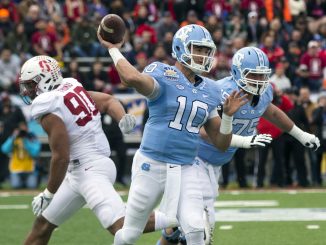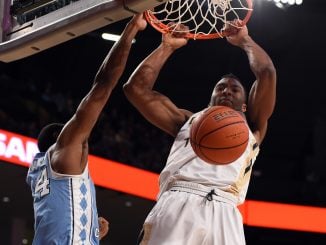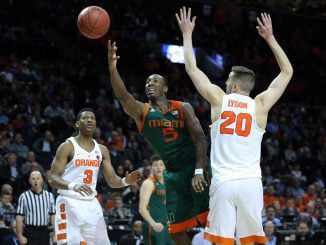
DURHAM — After a 4-0 start, Duke has lost its last two games. The offense has sputtered, and the defense has given up big plays.
With that in mind, coach David Cutcliffe delivered a message to his players.
“If you don’t like what you’re getting,” he said, “you’d better change what you’re doing.”
Cutcliffe and his staff revamped the team’s approach to practice this week, as Duke prepares to host a Florida State team that’s far better than its 1-3 record.
“Practice and preparation can become something you just do,” Cutcliffe said. “You’ve got to look at the actions you take in practice and balance it with the results you’re getting and the results you want. If the passing game is not what you want it to be, whether it’s a combination of accuracy, drops or protection, you’ve got to change your approach.”
That may sound like a panic move, but it’s business as usual for Cutcliffe.
“I’ve been through a lot as a coach,” he said. “I don’t think you ever punch a bell that’s called an alarm. You study what’s leading to the results. I’m about work. An alarm, to me, says, ‘Hey! We’ve got a problem!’ Work says we’re approaching everything in a way to end the problem. That’s where the focus lies.
“We’ve had times where I’ve probably wanted to panic,” Cutcliffe continued. “At Ole Miss, we went out to play Wyoming (the Rebels lost 37-32 to drop to 1-3). If it could go wrong, it did. I saw a lot of things that day I didn’t think I’d ever see. But it was no time to panic. I’ve been shut out as coordinator at University of Tennessee. I’ve been part of a staff there that hit 0-6. A guy got on top of a billboard and wouldn’t come down until we won. I thought we were going to break up a family. You’re driving to work and see a guy roosting on a billboard. You just work.”
So, as FSU game week opened, the team took a long look at mechanics and fundamentals.
“I don’t think I was as balanced as I should’ve been, at times,” said quarterback Daniel Jones. “I don’t think I was as fundamentally sound as I need to be to throw the ball consistently and accurately.”
Cutcliffe also made sure the receivers focused on little things.
“I can tell before the play,” Cutcliffe said. “I can stop play at practice after watching us line up, look at their stances and tell whether we’re going to have a positive play or not. There’s a mentality to lining up right.”
All of those corrections need to be done in practice before the coaches or players can even worry about the game.
“There is no such thing as a gamer,” Cutcliffe said. “I’ve heard that term before. I’ve been in athletics a long time. There are no gamers. They show up in practice. For receivers, short-space quickness and the ability to separate all starts with your stance. It starts with your start. I don’t care if it’s press coverage or off coverage. You need absolute focus. Catching a football is still partially focus. It’s talent, but there’s a mentality.”
To emphasize his point, Cutcliffe quoted auto pioneer Henry Ford.
“‘If you think you can, or if you think you can’t, you’re right,’ Cutcliffe said. “That’s where we are.”
“Henry Ford would’ve been a hell of a receivers coach,” he added. “I’d have hired him if he wasn’t already so busy.”



